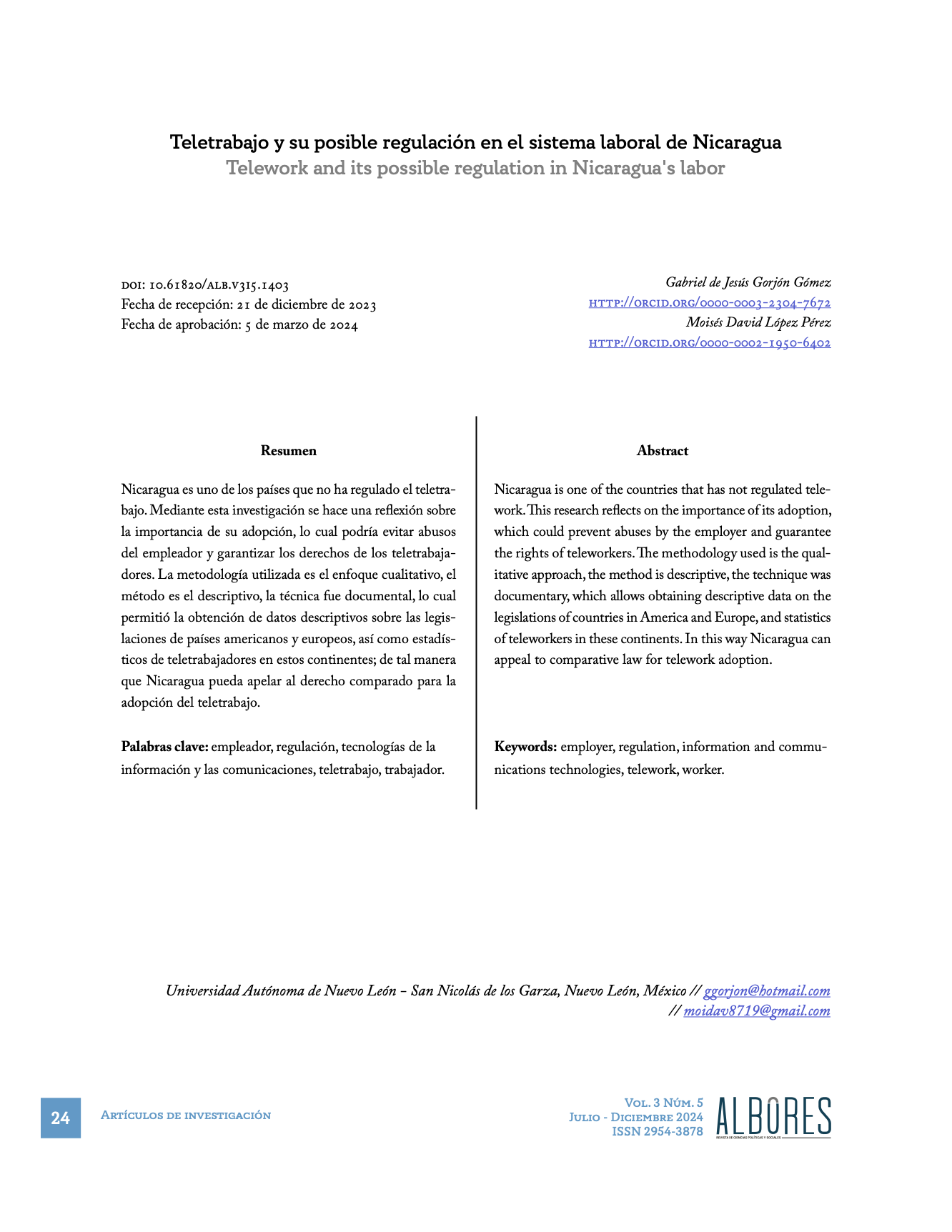
Keywords
regulation
information and communications technologies
telework
worker
Abstract
Nicaragua is one of the countries the Latin America that has not promoted a bill to regulate telework. Regulating telework would prevent abuses by employers and guarantee the rights of these workers. It is considered relevant to demonstrate the importance of regulating this modality in Nicaragua, for this research is carried out with a qualitative approach, supported by the descriptive method and using the documentary technique. This article is valuable among other reasons because it presents elements that should be considered by the state of Nicaragua for the adoption of telework in its labor system.

This work is licensed under a Creative Commons Attribution-NonCommercial-ShareAlike 4.0 International License.
Copyright (c) 2024 Albores
Similar Articles
- Lourdes Leticia Machado Balbuena, Williams Chavero Jiménez, Juan Pedro Horta Sánchez, Mariana Itzel Nava Rodríguez, Impact of information and communication technology (ICT) on the child and adolescent population during the COVID-19 pandemic: Analysis from a bioethical perspective , Albores: Vol. 3 No. 4 (2024): Albores. Revista de Ciencias Políticas y Sociales
- Mariana Chavez Castañeda, Betsabée Fortanell Trejo, Daniel Martínez Sahagún, Multidimensional model for the study of native digital media , Albores: Vol. 3 No. 4 (2024): Albores. Revista de Ciencias Políticas y Sociales
- Oscar Basave Hernández, María Ysabel Navarrete Radilla, Claudia Arroyo Salinas, Experiencies of Sociology Students who worked during the COVID-19 pandemic , Albores: Vol. 3 No. 4 (2024): Albores. Revista de Ciencias Políticas y Sociales
- Malinka Enya Aceves Martínez, Cultural Synchrony: K-pop, a Lifestyle for Young Queretaro Residents , Albores: Vol. 3 No. 4 (2024): Albores. Revista de Ciencias Políticas y Sociales
- Iván Patricio Ríos Sangucho, Discourses of inclusion, difference and normalization: The concept of inclusion in the construction of people with disabilities , Albores: Vol. 3 No. 5 (2024): Albores. Revista de Ciencias Políticas y Sociales
- Juan Pablo Rodríguez Huerta, Water management: a comparative analysis on water policies between Cape Town (2018) and Monterrey (2022) , Albores: Vol. 2 No. 3 (2023): Albores. Revista de Ciencias Políticas y Sociales
- Claudia Anait Ocman Azueta, Jaylin Guadalupe Negrete Ortiz, Overview of human mobility and climate change in the countries of Northern Central America. International, regional and state actions , Albores: Vol. 3 No. 4 (2024): Albores. Revista de Ciencias Políticas y Sociales
- Alberto Castro Valles, Maria Nieves González Valles, Karlotta Carrasco Castro, Perceptions of social rejection, emotional exhaustion, and substance consumption of sex workers in Ciudad Juarez , Albores: Vol. 3 No. 5 (2024): Albores. Revista de Ciencias Políticas y Sociales
- José Pablo Castañeda Castaños, The impact of industrialization on the lowest paid workers , Albores: Vol. 1 No. 1 (2022): Albores. Revista de Ciencias Políticas y Sociales
- María Verónica Murguía Salas, Ana Elizabeth Jardón Hernández, Memories of the COVID-19 pandemic. Experiences of the indirect workers of the Universidad Autónoma del Estado de México , Albores: Vol. 2 No. 3 (2023): Albores. Revista de Ciencias Políticas y Sociales
You may also start an advanced similarity search for this article.
Most read articles by the same author(s)
- Oscar Basave Hernández, María Ysabel Navarrete Radilla, Claudia Arroyo Salinas, Experiencies of Sociology Students who worked during the COVID-19 pandemic , Albores: Vol. 3 No. 4 (2024): Albores. Revista de Ciencias Políticas y Sociales
- Marisol Chavez Herrera, Miguel Ángel Sánchez Ramos, Roberto Moreno Espinosa, Barriers to the participation of rural migrant women from the State of Mexico in health and migration programs , Albores: Vol. 2 No. 3 (2023): Albores. Revista de Ciencias Políticas y Sociales
- Anthony Pérez Balcázar, Causal configurations for the strength of democracy in 83 countries. Qualitative analysis compared with fuzzy sets , Albores: Vol. 2 No. 3 (2023): Albores. Revista de Ciencias Políticas y Sociales
- Alan Suah Islas Ruiz, The spatial dimension of citizenship. Between modernity and postmodernity in public planning , Albores: Vol. 3 No. 4 (2024): Albores. Revista de Ciencias Políticas y Sociales
- Álvaro Jesús Chávez Hernández, Antonio Flores González, Octavio Cabrera Serrano, Cultural elements and sociopolitical uses of a celebration to the Souls in Santiago Mexquititlán , Albores: Vol. 2 No. 2 (2023): Albores. Revista de Ciencias Políticas y Sociales
- María Verónica Murguía Salas, Ana Elizabeth Jardón Hernández, Memories of the COVID-19 pandemic. Experiences of the indirect workers of the Universidad Autónoma del Estado de México , Albores: Vol. 2 No. 3 (2023): Albores. Revista de Ciencias Políticas y Sociales
- Ana Laura Meneses González, Border Horizon: The Urban Desert Narrated Through the Photographic Lens of Its Inhabitants , Albores: Vol. 1 No. 1 (2022): Albores. Revista de Ciencias Políticas y Sociales
- Gerardo Cantú Sanders, Thinking of social rights as the center of human rights , Albores: Vol. 2 No. 3 (2023): Albores. Revista de Ciencias Políticas y Sociales
- Brenda Monserrath Partida Gaxiola, Jesús Ignacio Ibarra Carmelo, Migrant Nahua and Mixtec artisans in their integration of tourism services on the beaches of Sonora and their settlement problems , Albores: Vol. 2 No. 3 (2023): Albores. Revista de Ciencias Políticas y Sociales
- Sofía Silva, Neither tracing nor copy, the size to South America. The activisms of Peruvian groups at the Nacional University of La Plata and in the city from the records of state police intelligence (1960-1970) , Albores: Vol. 3 No. 4 (2024): Albores. Revista de Ciencias Políticas y Sociales

